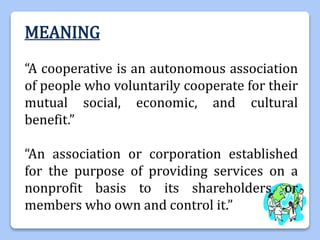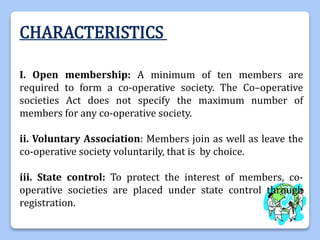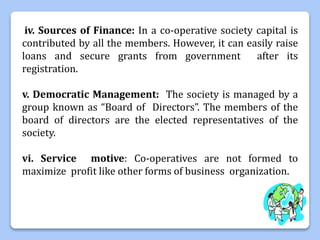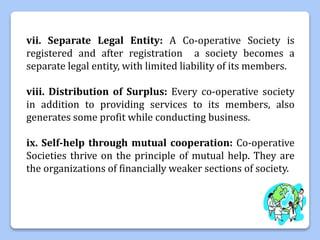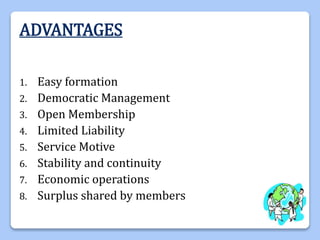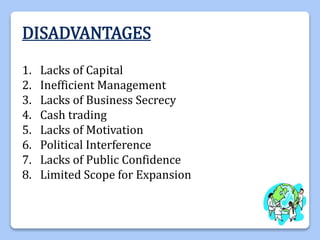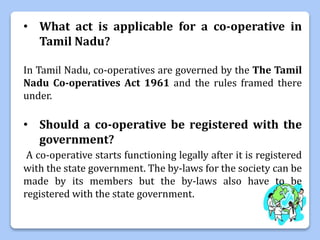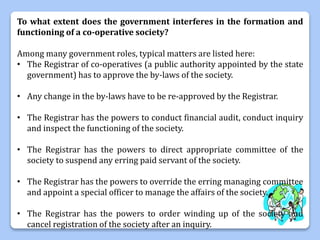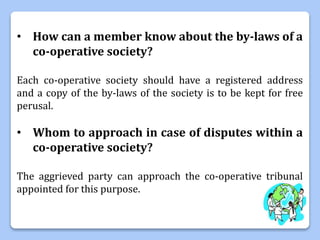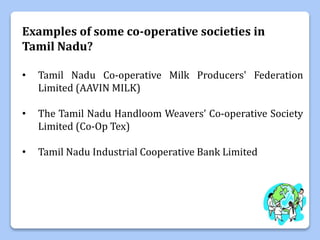Co operative society
- 2. MEANING “A cooperative is an autonomous association of people who voluntarily cooperate for their mutual social, economic, and cultural benefit.” “An association or corporation established for the purpose of providing services on a nonprofit basis to its shareholders or members who own and control it.”
- 3. CHARACTERISTICS I. Open membership: A minimum of ten members are required to form a co-operative society. The Co–operative societies Act does not specify the maximum number of members for any co-operative society. ii. Voluntary Association: Members join as well as leave the co-operative society voluntarily, that is by choice. iii. State control: To protect the interest of members, co- operative societies are placed under state control through registration.
- 4. iv. Sources of Finance: In a co-operative society capital is contributed by all the members. However, it can easily raise loans and secure grants from government after its registration. v. Democratic Management: The society is managed by a group known as “Board of Directors”. The members of the board of directors are the elected representatives of the society. vi. Service motive: Co-operatives are not formed to maximize profit like other forms of business organization.
- 5. vii. Separate Legal Entity: A Co-operative Society is registered and after registration a society becomes a separate legal entity, with limited liability of its members. viii. Distribution of Surplus: Every co-operative society in addition to providing services to its members, also generates some profit while conducting business. ix. Self-help through mutual cooperation: Co-operative Societies thrive on the principle of mutual help. They are the organizations of financially weaker sections of society.
- 6. ADVANTAGES 1. Easy formation 2. Democratic Management 3. Open Membership 4. Limited Liability 5. Service Motive 6. Stability and continuity 7. Economic operations 8. Surplus shared by members
- 7. DISADVANTAGES 1. Lacks of Capital 2. Inefficient Management 3. Lacks of Business Secrecy 4. Cash trading 5. Lacks of Motivation 6. Political Interference 7. Lacks of Public Confidence 8. Limited Scope for Expansion
- 8. • What act is applicable for a co-operative in Tamil Nadu? In Tamil Nadu, co-operatives are governed by the The Tamil Nadu Co-operatives Act 1961 and the rules framed there under. • Should a co-operative be registered with the government? A co-operative starts functioning legally after it is registered with the state government. The by-laws for the society can be made by its members but the by-laws also have to be registered with the state government.
- 9. To what extent does the government interferes in the formation and functioning of a co-operative society? Among many government roles, typical matters are listed here: • The Registrar of co-operatives (a public authority appointed by the state government) has to approve the by-laws of the society. • Any change in the by-laws have to be re-approved by the Registrar. • The Registrar has the powers to conduct financial audit, conduct inquiry and inspect the functioning of the society. • The Registrar has the powers to direct appropriate committee of the society to suspend any erring paid servant of the society. • The Registrar has the powers to override the erring managing committee and appoint a special officer to manage the affairs of the society. • The Registrar has the powers to order winding up of the society and cancel registration of the society after an inquiry.
- 10. • How can a member know about the by-laws of a co-operative society? Each co-operative society should have a registered address and a copy of the by-laws of the society is to be kept for free perusal. • Whom to approach in case of disputes within a co-operative society? The aggrieved party can approach the co-operative tribunal appointed for this purpose.
- 11. Examples of some co-operative societies in Tamil Nadu? • Tamil Nadu Co-operative Milk Producers' Federation Limited (AAVIN MILK) • The Tamil Nadu Handloom Weavers’ Co-operative Society Limited (Co-Op Tex) • Tamil Nadu Industrial Cooperative Bank Limited

